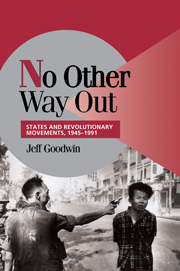Book contents
- Frontmatter
- Contents
- Figures, Tables, and Maps
- Abbreviations and Acronyms
- Preface and Acknowledgments
- Part 1 Introduction
- Part 2 Southeast Asia
- CHRONOLOGY FOR SOUTHEAST ASIA
- 3 THE FORMATION OF REVOLUTIONARY MOVEMENTS IN SOUTHEAST ASIA
- 4 THE ONLY DOMINO: THE VIETNAMESE REVOLUTION IN COMPARATIVE PERSPECTIVE
- Part 3 Central America
- Part 4 Further Comparisons and Theoretical Elaborations
- Annotated Bibliography
- Index
- Titles in the series
4 - THE ONLY DOMINO: THE VIETNAMESE REVOLUTION IN COMPARATIVE PERSPECTIVE
Published online by Cambridge University Press: 05 June 2012
- Frontmatter
- Contents
- Figures, Tables, and Maps
- Abbreviations and Acronyms
- Preface and Acknowledgments
- Part 1 Introduction
- Part 2 Southeast Asia
- CHRONOLOGY FOR SOUTHEAST ASIA
- 3 THE FORMATION OF REVOLUTIONARY MOVEMENTS IN SOUTHEAST ASIA
- 4 THE ONLY DOMINO: THE VIETNAMESE REVOLUTION IN COMPARATIVE PERSPECTIVE
- Part 3 Central America
- Part 4 Further Comparisons and Theoretical Elaborations
- Annotated Bibliography
- Index
- Titles in the series
Summary
A measured response to the convulsion in Viet Nam could have been devised by the French; they could have created institutions granting power to indigenous citizens and permitting them opportunities for political mobilization on French terms, but this appeared to be unnecessary and the institutions seemed difficult beyond comprehension to construct. For this miscalculation France was to pay a dear price.
– John T. McAlister, Jr. (1969: 274)Indochina under the French was a prison, and there was nothing to do but unite against the jailer.
– Ngo Van, Trotskyist militant (quoted in Goldner 1997: 140)This chapter, building on the previous one, attempts to explain the different outcomes of the transnational cycle of protest that erupted across colonial Southeast Asia during the decade following World War II. I claim, once again, that a state-centered approach best explains these outcomes. I argue, more specifically, that the success or failure of Communist movements in actually seizing state power in this region was determined by the specific characteristics of colonial (or neocolonial) rule in each national society, particularly policies toward moderate nationalists. This chapter, then, takes the existence of the Communist-led national liberation movements that emerged during and immediately after the Japanese occupation of World War II as “given” for present purposes.
The analysis of this chapter reflects two growing concerns in recent analyses of social movements.
- Type
- Chapter
- Information
- No Other Way OutStates and Revolutionary Movements, 1945–1991, pp. 106 - 134Publisher: Cambridge University PressPrint publication year: 2001



